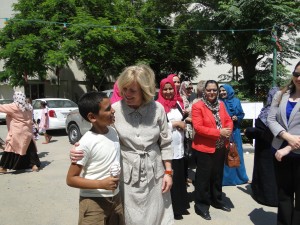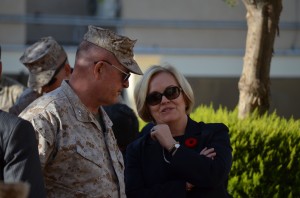
Ambassador Deborah Jones had two conditions before agreeing to succeed Ambassador Christopher Stevens as U.S. Ambassador to Libya following his death. First, that she could bring her Jack Russell terrier, Dusty, with her to Tripoli; second, that she receive full disclosure of exactly what happened in Benghazi on Sept. 11, 2012.
The attack in Benghazi that ended in Ambassador Stevens’ death and the deaths of three other Americans was the result of an assault by more than 100 heavily armed Libyan gunmen. The event has been shrouded by political controversy, particularly because it occurred just months before the 2012 presidential election. Even today, questions remain about what provoked the attack, why the U.S. government did not provide sufficient security despite repeated requests and why President Obama, Susan Rice and Hillary Clinton misreported initial facts, possibly in attempt to cover up or downplay the episode.
Ambassador Jones, who graduated from BYU in 1978 with a bachelor’s degree in history, was sworn in as U.S. Ambassador to Libya on June 11, 2013, nine months after Ambassador Stevens’ death. Her position in Libya follows 20 years in the Foreign Service in a variety of roles in the Middle East, including ambassador to Kuwait.
At Ambassador Jones’ swearing-in ceremony, Secretary of State John Kerry said it was no secret she was entering one of the toughest jobs in the Foreign Service, representing the U.S. at a critical time in history.
“She personifies, really, the very best of the Foreign Service,” Kerry said. “For her, it’s not a just a job; it’s a calling. It’s a mission, and she shares that with her predecessor, Chris.”
Ambassador Jones said in her swearing-in speech that for her, the nomination was a once-in-a-lifetime opportunity to make a difference in Libya as it experiences a “democratic evolution.” Libya was oppressed for 42 years under the dictatorship of Muammar Gaddafi before his assassination in 2011. Since his death, the country has been in a state of unrest as Libyans attempt to form a new government through revolution.

In an interview with The Universe, Jones said security was a major consideration in accepting the position, especially because she is a mother to two daughters. She also recognized that a certain level of risk comes with the job. Since Benjamin Franklin sailed to France as America’s first diplomat, on average one individual from the Foreign Service has been killed or died of disease every year in the line of duty.
According to Ambassador Jones, current security conditions make it highly unlikely that any sort of attack could occur on the Tripoli compound.
“Now, will people look for weak spots? That’s what people do. They look for where you have that seam, that weak area,” she said. “You can never say with 100 percent certainty that something won’t happen, but having said that, we certainly would never have that kind of breach of our parameter here that occurred in Benghazi.”
In terms of what happened in Benghazi, Ambassador Jones said, “there’s no scandal.”
“I have access to everything regarding the attack on the facility in Benghazi, so I could understand it completely — what the sequence of events was, what might have led to it and how it could be avoided in the future,” she said. “I was given full access to everything. There were no mysteries there.”

When Ambassador Jones arrived in Tripoli to begin her role as ambassador, she was cognizant of the fact that she would be entering a traumatized mission. Much of the staff had worked closely with Ambassador Stevens.
“We took some time to have a ceremony and to plant an olive tree with a plaque of Chris and to take time to honor them properly at post and to let people grieve that through,” Ambassador Jones said.
“But I will tell you something,” Jones said. “If Chris were alive, I’m sure he’d be saying ‘Get out there, make contact, do work, do the diplomacy. That’s what we’re here to do.'”
Despite the pain of recent events, Ambassador Jones said she has been impressed with the commitment of everyone currently serving with her in Libya.
“They really haven’t had to force anyone to come serve here in Tripoli. They all volunteer,” she said. “We have more people who want to come out here and serve than we have space for at the compound.”
Ambassador Jones’ efforts on the ground include helping Libya build a national army, secure its borders, refine its basic governance skills, improve international trade and update its petroleum law.
“We’re here to help them do what they decide they need to do to build their country and keep it stable,” she said.
Reaching stability is not without roadblocks for Libya.
“This a big country, full of arms, that has never been fully united. It’s a geography that has always been difficult. It’s city-states and oases and tribes surrounded on both sides by an ocean of water and an ocean of sand,” she said. “So it’s tough, but it’s where we are and what we’re doing.”
Ambassador Jones said she has been asked repeatedly throughout her career as a diplomat in the Middle East whether she is faced with stereotypes related to her gender. Rather than a hindrance, she found being a woman in a leadership position in the Middle East has given her a unique advantage.
In many Middle Eastern countries, where leadership is hereditary or tribal, rulers often see other males as competitors. Jones is given honorary male status for the purpose of doing business, as women are not typically permitted to attend certain events and meetings. Still, she said, she is not seen as competition because she is female; she can therefore form closer relationships with leaders.
“I have access that male officers don’t have,” she said.
Jones is also working to preserve the country’s “magnificent” five national heritage sites and create opportunities for Libyan students to participate in exchange programs in the United States.
“Foreign service is for the intellectually ADHD because there’s always something new every day, something on a different topic,” she said.




